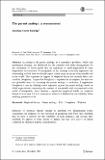Files in this item
The parent analogy: a reassessment
Item metadata
| dc.contributor.author | Rutledge, Jonathan | |
| dc.date.accessioned | 2016-10-27T16:31:06Z | |
| dc.date.available | 2016-10-27T16:31:06Z | |
| dc.date.issued | 2017-08 | |
| dc.identifier | 246332585 | |
| dc.identifier | 7c0f6a4f-61ce-4992-a01c-c2d5755fb041 | |
| dc.identifier | 84990848122 | |
| dc.identifier | 000410184300002 | |
| dc.identifier.citation | Rutledge , J 2017 , ' The parent analogy: a reassessment ' , International Journal for Philosophy of Religion , vol. 82 , no. 1 , pp. 5-14 . https://doi.org/10.1007/s11153-016-9588-8 | en |
| dc.identifier.issn | 1572-8684 | |
| dc.identifier.other | ORCID: /0000-0002-9521-8031/work/54516637 | |
| dc.identifier.uri | https://hdl.handle.net/10023/9720 | |
| dc.description.abstract | According to the parent analogy, as a caretaker’s goodness, ability and intelligence increase, the likelihood that the caretaker will make arrangements for the attainment of future goods that are unnoticed or underappreciated by their dependents also increases. Consequently, if this analogy accurately represents our relationship to God, then we should expect to find many instances of inscrutable evil in the world. This argument in support of skeptical theism has recently been criticized by Dougherty. I argue that Dougherty’s argument is incomplete, for there are two plausible ways of construing the parent analogy’s conclusion. I supplement Dougherty’s case by offering a new argument against the parent analogy based on failed expectations concerning the amount of inscrutable evils encountered in the world. Consequently, there remains a significant empirical hurdle for skeptical theism to overcome if it is to maintain its status as a defeater for our reliability when tracking gratuitous evils. | |
| dc.format.extent | 330938 | |
| dc.language.iso | eng | |
| dc.relation.ispartof | International Journal for Philosophy of Religion | en |
| dc.subject | Skeptical theism | en |
| dc.subject | Parent analogy | en |
| dc.subject | Evil | en |
| dc.subject | Dougherty | en |
| dc.subject | Wykstra | en |
| dc.subject | BT Doctrinal Theology | en |
| dc.subject | T-NDAS | en |
| dc.subject.lcc | BT | en |
| dc.title | The parent analogy: a reassessment | en |
| dc.type | Journal article | en |
| dc.contributor.institution | University of St Andrews. School of Divinity | en |
| dc.identifier.doi | https://doi.org/10.1007/s11153-016-9588-8 | |
| dc.description.status | Peer reviewed | en |
This item appears in the following Collection(s)
Items in the St Andrews Research Repository are protected by copyright, with all rights reserved, unless otherwise indicated.

